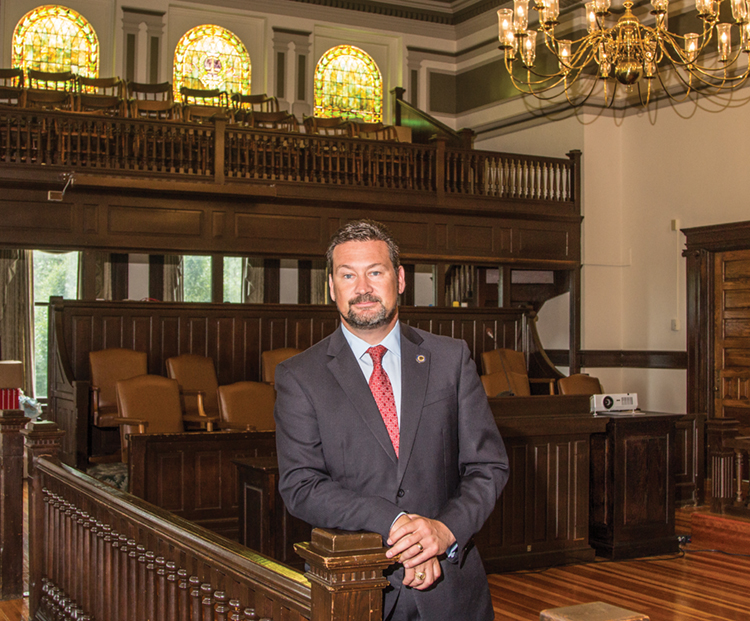Charles Branson, District Attorney
| 2015 Q3 | by CHARLES BRANSON | photos by STEVEN HERTZOG |

Charles Branson
What would you say is the DA office’s most important service or duty?
One of the most important obligations of our office is transparency. However, the nature of what we do does not lend itself to being open and public about all the processes in the legal system. It is vitally important the public trusts in what our office does and the decisions we make. Competing with that interest is the privacy rights of victims and witnesses, along with constitutional rights of defendants. In deciding to charge a case or not, or resolving a case through plea or trial, we have to balance those interests daily.
What is your top priority?
The ultimate goal of our office is to enhance public safety, decrease crime by making offenders accountable for their actions and provide relief to victims and witnesses.
What have been some of the most important aspects of your success?
Prosecution through the last several years has slowly evolved from a case-processing system to a problem-solving system. We constantly strive to treat like cases the same while seeking individual results within those cases to achieve meaningful outcomes. For example, several years ago, we revised how domestic violence cases where handled in the office. We abandoned the “no drop” policies designed to treat every case the same and push every case to a legal conclusion to a problem-solving approach. Each case is now individually reviewed and a determination is made to identify ways to affect the relationship between the abuser and survivor. As problem-solvers, we are trying to identify case outcomes that make it more likely that victim will not need our services in the future by looking at safety issues, counseling and substance-abuse treatment, and other interventions that may make a long-term difference in the relationship.
How many people does the DA’s office employ? How many of those live in Lawrence? And does your office encourage people to live in Lawrence?
Our staff consists of 14 attorneys and 16 support staff. In additional to regular staff, we also employ third-year law students who have temporary licenses to practice law through an intern program. Most of our staff members reside in Lawrence or Douglas County. We encourage people to live in Douglas County, but we also recognize that professional staff may have families rooted in nearby committees. We encourage all of our staff to be active participants locally through volunteer work and board memberships.
How do you make a positive impact on the Lawrence community?
Few people realize the scope or impact of our work. Most people think of criminal cases when they think of our office. In fact, with over 1500 criminal cases filed a year, that is the majority of our work. However, we also handle over 100 child-in-need-of-care cases a year, protecting children from abuse and neglect. We file over 300 juvenile-offender cases, where adolescents have found themselves in trouble with the law. We handle thousands of traffic cases from driving under the influence to simple traffic infractions. We also file over 150 care and treatment cases, where those who are in a mental-health crisis or are no longer able to care for themselves, or are a danger to themselves or others are placed in custody for treatment. We also maintain an active consumer-protection division, where our mission is to educate the public about the latest trends in consumer fraud.
What do you see as your personal responsibility to the community?
My job is to be the community steward of the public’s resources when it comes to the safety and security of our community. Effective management and planning of those resources is vital to the livability of our community.
How do you manage your day-to-day stress of the district?
There is no doubt our office sees the worst of society some days. Fortunately, I have wonderful coworkers who realize we are all in this together for the benefit of our community. Most importantly, I am blessed with a wonderful family that enjoys spending time with each other, whether it is a trip to the lake, a sporting event or a school activity.
How do you reward excellent work performance? How do you manage poor performance?
I believe in providing year-round, ongoing feedback to our staff and in having an open-door policy with them. If they have a concern, they know they can meet with me at any time. Continuing and ongoing feedback inspire exceptional performance much more so than relying solely on an annual review. The same can be says for managing poor performance. Excellent performance can be rewarded with more challenging assignments. Because our office is publicly centered, excellent performance is often rewarded from outside the office with the satisfaction and relief brought to victims.
What is the biggest challenge you feel Douglas County faces?
Starting in the mid 1990s, the state legislature embarked on defunding and scaling back state support for mental-health and substance-abuse issues. That trend has continued to today. Our community continues to struggle with how to handle people in crisis and those who are suffering from substance-abuse issues. Those struggles often result in criminal conduct placing the offender in a criminal justice system that is not designed to deal with their particular needs. This trend causes an increase in our jail population and often results in extended stays because appropriate placement in the community is difficult, if not impossible. Our office continues to work with various groups to try and determine long-term solutions to these matters.
Over the course of your career, what has been the single largest change in the Lawrence community?
Within the confines of the legal community, I would have to say that the single largest change in our community is the influx of technology. Technology has permeated just about every aspect of the criminal-justice field. Ten years ago, it was a novelty to have a camera mounted in a police car or to have an interview recorded with both video and audio. Now, it is routine to have complete cell phone records of suspects or surveillance video from a crime scene. With the advances in technology and the push for more accountability from law enforcement, this area will continue to grow at an exponential rate.
What do you foresee as being the biggest challenge for your office currently and in the future? On a local level? On a national level?
The biggest challenge we face locally and nationally is the human propensity for a rush to judgment when a particular event or crime occurs. I often find myself asked about events in the news and whether I think someone was guilty, or did someone botch an investigation or was there a cover-up. My answer usually shocks people. I tell them, “I don’t know. I was not there, I did not read the investigation and I have not heard all the evidence.” Yet, we see time and again someone analyzing the event within minutes of it happening. Fortunately, in a society full of instant gratification, we have an old-fashioned system called a jury trial where we ask everyday people to come in and clear their mind, and listen carefully to the testimony and evidence presented in the courtroom; then after they have heard all that, the law will allow them to make a decision about what they believed to have happened. Our system is slow and steady, but it gets there, and we must resist the desire to change or criticize it because it is not as fast as we would like.




29 Comments
A big thank you for your post.Really thank you! Awesome.
Nice post. I was checking continuously this blog and I am impressed! Extremely useful info specially the last part 🙂 I care for such information much. I was looking for this particular information for a long time. Thank you and good luck.
Hey there! I just wanted to ask if you ever have anyissues with hackers? My last blog (wordpress) was hackedand I ended up losing months of hard work due to no backup.Do you have any solutions to prevent hackers?
This post is worth everyone’s attention. How can I find out
It’s difficult to find well-informed people in this particular topic,however, you sound like you know what you’re talking about!Thanks
A big thank you for your blog article. Fantastic.
That is a really good tip particularly to those fresh to the blogosphere. Simple but very accurate information… Appreciate your sharing this one. A must read post!
I truly appreciate this blog post. Really Cool.
Appreciate you sharing, great blog post.Thanks Again. Awesome.
kamagra en ligne: commander Kamagra en ligne – pharmacie en ligne livraison europe
This is a very good tip particularly to those fresh to the blogosphere. Simple but very precise informationÖ Thanks for sharing this one. A must read article!
Greetings! Very useful advice in this particular article! It’s the little changes that produce the largest changes. Thanks for sharing!
Thanks-a-mundo for the post.Thanks Again. Will read on…
wow, awesome article post.Really looking forward to read more. Really Great.
I was suggested this blog by way of my cousin. I’m now not sure whether this put up is written by him as no one else recognise such specified about my difficulty. You are incredible!
Link Xem Trực Tiếp Soccer Futsal Việt Nam Vs Lebanon Vòng Chủng Loại World Cupxôi yếnNếu cứ chơi như cách vừa đè bẹp Everton cho tới 3-1 bên trên sân quý khách hàng
Thanks so much for the post.Really thank you! Will read on…
This was novel. I wish I could read every post, but i have to go back to work now But I all return.
I savor, cause I discovered exactly what I used to be looking for.You have ended my four day lengthy hunt! God Bless you man. Have a great day.Bye
Rfpezg – ou acheter du tadalafil Xrxjlx ltnhqo
Great post about this. I’m surprised to see someone so educated in the matter. I am sure my visitors will find that very useful.
A round of applause for your post.Really thank you! Awesome.
lexapro side effects weight gain lexapro weight loss stories
wow, awesome blog post.Really thank you! Want more.
pharmacie sans ordonnance montpellier: traitement acn̩ sans ordonnance en pharmacie Рvitamine d sans ordonnance pharmacie
donde comprar champix sin receta: comprar tamoxifeno sin receta – donde comprar doxiciclina sin receta
Looking forward to reading more. Great post.Much thanks again. Fantastic.
blemish age defense: clomid sans ordonnance pharmacie – bandelette urinaire en pharmacie sans ordonnance
farmacia alemana online: test de saliva farmacia online Рse puede comprar tramadol sin receta m̩dica